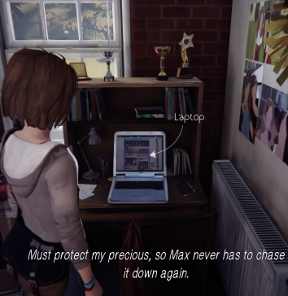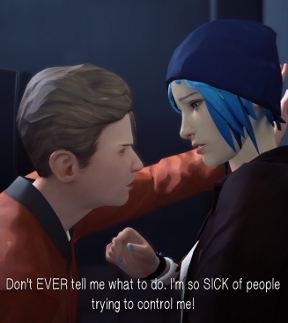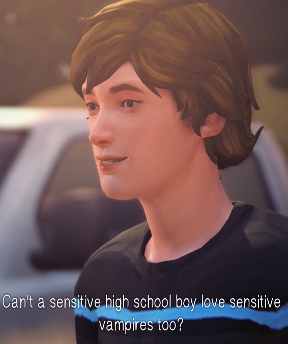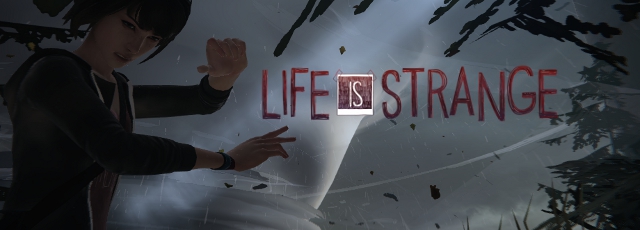![]() Please note that this game deals with themes some may find upsetting. Please see my comment below the review if you need further details to make an informed decision about whether to play.
Please note that this game deals with themes some may find upsetting. Please see my comment below the review if you need further details to make an informed decision about whether to play.
The first episode of Life is Strange, the new episodic action adventure from SquareEnix and DONTNOD Entertainment, starts off with a literal bang as our heroine, school student Max, wakes up on a dark and thunderous coast that's being ripped apart by a tornado that looks big enough to swallow the world. When she snaps to and finds herself in photography class moments later, she's more than a little rattled... she didn't fall asleep, after all, and that didn't feel like a dream, so maybe she's losing her mind? Or maybe she's just having trouble adjusting to prestigious private school Blackwell Academy, which hasn't turned out to be the glorious dream school she thought it would be... Max has never been comfortable around people, and the teasing of school snobs combined with her loads of homework and an unexpectedly sharp difficulty curve isn't making things any easier. Especially since Max grew up in the sleepy town of Arcadia Bay, and she's trying to work up the courage to speak to Chloe, the best friend she hasn't spoken to in the five years since she moved away. But there's something strange about Arcadia, like the missing girl everyone is talking about... and there's something strange happening with Max, too. She's just your average eighteen year old girl who discovers she has the ability to rewind time and change the past... something she can use to help people, but also, she thinks, make all the right decisions for her life. Guided by your choices, Life is Strange is a gorgeously rendered and acted tale about growing up, identity, power, and what you choose to do with it.
 To play Life is Strange, you use either [WASD] or the [arrow] keys to move, and the mouse to look around and interact. Click on a person or object to bring up any available contextual actions, like "look" or "speak", and drag your mouse towards the option you want before releasing. When she gains the ability, you can rewind time by holding down the right mouse button, while holding left [shift] makes it rewind faster. Hitting left [control] will automatically rewind to your last decision point. Watch for an icon that appears in the upper left corner of the screen, which means you've learned something that could be useful if you were to turn back time. If that icon is a butterfly, it means your decision impacts the game's story, so this is your chance to change your mind if you want to. Max is unaffected by the time changes, so any items you pick up will remain with her even if she has to rewind time back to before you did so. In doing so, you can figure out ways to prevent certain events from happening, even when it seems like you don't have enough time to take action, or otherwise could only do something that wound up getting Max hurt.
To play Life is Strange, you use either [WASD] or the [arrow] keys to move, and the mouse to look around and interact. Click on a person or object to bring up any available contextual actions, like "look" or "speak", and drag your mouse towards the option you want before releasing. When she gains the ability, you can rewind time by holding down the right mouse button, while holding left [shift] makes it rewind faster. Hitting left [control] will automatically rewind to your last decision point. Watch for an icon that appears in the upper left corner of the screen, which means you've learned something that could be useful if you were to turn back time. If that icon is a butterfly, it means your decision impacts the game's story, so this is your chance to change your mind if you want to. Max is unaffected by the time changes, so any items you pick up will remain with her even if she has to rewind time back to before you did so. In doing so, you can figure out ways to prevent certain events from happening, even when it seems like you don't have enough time to take action, or otherwise could only do something that wound up getting Max hurt.
 Initially it's easy to see how some actions are going to turn out, and what the best choice for Max is. Episode One, however, definitely has a very "training wheels" sort of feel to it, and it slowly begins obfuscating the obvious future for choices. What's interesting about the whole mechanic is the implications it brings up... saving people and generally "doing good" is one thing, but manipulating people by using your abilities to learn information and shape their opinions of you is another. If, for example, you kept rewinding your interactions with someone to learn the perfect things to say and do to make them fall for you, are they really in love, or did you just manipulate them? It's a question of morality that has been addressed before, but you can see Life is Strange setting itself up to potentially take it on in interesting ways through Max's seemingly innocent interactions with other characters. There's nothing about the game that's particularly difficult, and the few puzzles you'll encounter tend to be straight-forward and obvious, so the emphasis here is more on guiding the narrative than anything else. The way Max interacts with her "enemy" Victoria, whether she stands up for someone in trouble or keeps her head down to protect her scholarship, even heavier themes that you don't often see tackled or brought up at all in games. The characters aren't defined by their trauma or their heartache, nor are they all victims
Initially it's easy to see how some actions are going to turn out, and what the best choice for Max is. Episode One, however, definitely has a very "training wheels" sort of feel to it, and it slowly begins obfuscating the obvious future for choices. What's interesting about the whole mechanic is the implications it brings up... saving people and generally "doing good" is one thing, but manipulating people by using your abilities to learn information and shape their opinions of you is another. If, for example, you kept rewinding your interactions with someone to learn the perfect things to say and do to make them fall for you, are they really in love, or did you just manipulate them? It's a question of morality that has been addressed before, but you can see Life is Strange setting itself up to potentially take it on in interesting ways through Max's seemingly innocent interactions with other characters. There's nothing about the game that's particularly difficult, and the few puzzles you'll encounter tend to be straight-forward and obvious, so the emphasis here is more on guiding the narrative than anything else. The way Max interacts with her "enemy" Victoria, whether she stands up for someone in trouble or keeps her head down to protect her scholarship, even heavier themes that you don't often see tackled or brought up at all in games. The characters aren't defined by their trauma or their heartache, nor are they all victims
 While a lot of the dialogue that comes out of Max and other people her age is a little too trendy-snarky to always sound natural, by and large the game is extremely well written, and well acted, though character mouths don't always sync up with what they're saying. It's a beautiful game in a lot of ways, and also worth mentioning is how diverse the in-game world is, not just in terms of skin colour, but body type too. Tall and short, lanky and plump, curvaceous and lithe, Life is Strange manages to represent a far more realistic slice of life than nearly any other game out there. At the same time, however, Life is Strange deals with people beyond its sci-fi/thriller plot mechanics. Max is initially awkward and afraid to contact Chloe after so many years of silence, and doesn't recognise a lot about the person her former best friend has become. The story focuses on the two of them a great deal, about how some friendships can't ever really be broken regardless of time and change, and those themes of female love and friendship are refreshing to see. Episode One sets up a great deal of different plot threads and doesn't really offer any answers, but its pacing is excellent. You can see it crafting the bigger story in front of you, and while I hope down the road Max's power is used in more interesting ways to impact the gameplay, as it stands, I'm still waiting for Episode Two to come out in March with far more impatience than I expected. If you love a finely crafted tale and complicated characters, you absolutely need to pick up the first episode of Life is Strange and get to know Max, Chloe, and the others. Highly recommended.
While a lot of the dialogue that comes out of Max and other people her age is a little too trendy-snarky to always sound natural, by and large the game is extremely well written, and well acted, though character mouths don't always sync up with what they're saying. It's a beautiful game in a lot of ways, and also worth mentioning is how diverse the in-game world is, not just in terms of skin colour, but body type too. Tall and short, lanky and plump, curvaceous and lithe, Life is Strange manages to represent a far more realistic slice of life than nearly any other game out there. At the same time, however, Life is Strange deals with people beyond its sci-fi/thriller plot mechanics. Max is initially awkward and afraid to contact Chloe after so many years of silence, and doesn't recognise a lot about the person her former best friend has become. The story focuses on the two of them a great deal, about how some friendships can't ever really be broken regardless of time and change, and those themes of female love and friendship are refreshing to see. Episode One sets up a great deal of different plot threads and doesn't really offer any answers, but its pacing is excellent. You can see it crafting the bigger story in front of you, and while I hope down the road Max's power is used in more interesting ways to impact the gameplay, as it stands, I'm still waiting for Episode Two to come out in March with far more impatience than I expected. If you love a finely crafted tale and complicated characters, you absolutely need to pick up the first episode of Life is Strange and get to know Max, Chloe, and the others. Highly recommended.
![]() Windows:
Windows:
Life is Strange: Episode One

Life is Strange: Complete Season







For those with certain sensitivities, please be aware that this game contains some themes they may find to be triggering, or just not something they wish to deal with. These issues are
sexual and physical assault, bullying, implied abortion, recreational drug use.
Regarding that first point in more detail,
one girl recounts the night someone "dosed" her drink at a party. There are no specific details regarding the attack, but the obvious implication is that it was attempted sexual assault.
Please always feel free to ask if you ever need any clarification on a theme or a game's rating to play for your comfort level!
Okay, I get how you gotta tell the world about any new game, but seriously, this game is just terrible. Like, not even justifiable, it's just bad.
The graphics are a bizarre combination of terrible and insufferable. See those character pictures up there? See the hair? That hair looks like the kind you stick on Lego heads, and it's just as bad in motion. The graphics look like something from the beginning of the Playstation 3 era, and on top of everything else they stuck a godawful indie hand-drawn filter over everything, the kind of shaky pencil drawing you see in every indie film. Looking like Juno is not something you should strive for.
And the writing. Oh christ, the horrible writing. The main characters are all embarrassing hipsters who hate everything that sounds like "conformity", who stick memes on everything. Max's friend's stepdad is portrayed as a bad guy just because he owns guns and set up cameras in his own house. And why is this a bad thing? The first thing you do in the game is save that same girl from getting shot. Why is her stepdad evil for wanting her to be safe?
What's the point of decision making in this game? Not only is this an episodic series, which are notorious for for having decisions with no bearing on the story whatsoever, but it's a game where you can reverse time and change your decisions at just about any time. The entire game is filled with Max's nonstop internal commentary on everything that happens, which violates the number one rule of writing, show don't tell. Max can instantly master her time-travel powers once she learns about them, and less than five minutes before the episode is over, she masters an entirely new technique, one that makes no sense whatsoever, and that she never even heard of until that exact moment. That's just horrible writing.
tl;dr - The characters are unlikable, the writing sucks a fat one, and the main character has no flaws whatsoever while every single authority figure is supposed to be evil because Max disagrees with them. It's basically Pretentious Hipster Teenagers: The Videogame.
Comment has been edited to include spoiler tags. - Ed.
Sorry you disliked it! We only cover games we love, not "any new game ", so we'll have to agree to disagree on your assessment. Fortunately we cover enough games of all types here so you're bound to find something else for you. :) I do think you're wrong about one thing, though, or at the very least drastically oversimplifying the game's themes and characters.
Chloe's stepfather isn't "evil because they disagree" or "because he likes guns" . He's troubling because he's harassing students to the point of threats that even the principal points out is beyond his authority, and the cameras are concerning because as the story points out, he's secretly recording people, including his wife and stepdaughter, without their knowledge. He's demeaning and threatening to Chloe, to the point of being controlling and emotionally abusive.
Further, regarding the principal,
he's not "bad because he's an authority figure". He's bad because when Max goes to him to tell him about the gun-wielding student, he calls her parents and accuses her of "making up stories" because the student in question is rich. If you choose NOT to tell him about the gun, he badgers her for "looking like she's trying to start trouble" and accuses her of being a liar when she insists she just went to the bathroom because she didn't feel well and threatens to call her parents and revoke her scholarship... all for allegedly "being a troublemaker", when the worst thing she did was "look troubled". His reaction is completely irrational and out of proportion, likely due to the alcohol Max's notes say people often smell on him. Someone who accosts, threatens, and snaps at a student they have power over for no reason, or alternately chooses to brand that student a liar because another student has more money, is a BAD authority figure.
Regarding Max mastering her powers, well, I think that fits the narrative and episodic scope. This first episode could have spent hours banging on about her struggling to use them, and instead by having her develop a control over them fairly quickly, they allow the plot and characters to be established and set the game up as a character drama to boot. Besides, who's to say Max has "mastered" them? All we know for now is that she can rewind time a certain way. Not how it will impact the story later on, or whether she's, say, been inadvertently shredding the timeline or causing damage somehow. We'll have to wait and see.
Also, please remember in the future to use spoiler tags when discussing plots as extensively as you have. It's only polite for your fellow readers. Thanks!
I think this game looks like a lot of fun. I love games based more on story than reflexes. Unfortunately I don't own a Windows and I can't buy games so...
Next time.
I have a question regarding the characters' interactions. Dora, you mentioned in your review "female love", so I want to ask:
are/were Max and Chloe romantically involved or attracted to each other? The game looks quite interesting, but I am uncomfortable with homosexual themes, for personal and private reasons (and I do not mean to condemn or judge anyone -- as I said, my reasons for that are very personal and very private). I do hope this question isn't offensive, as it truly is not intended to be, but I would like to know the answer before I consider buying this game for the sake of my own peace of mind.
Thanks in advance! :)
Hey there! Unfortunately, the answer isn't clear as of this episode.
"Female love" here largely refers to the closeness between two female characters, which is often treated as an aside in narratives... Max and Chloe clearly were very close before Max moved, best friends who knew each other better than anyone, and they're sort of rediscovering each other now five years later, learning how they both have changed, and how that ultimately doesn't matter. There was a line that might have implied there was something romantic between them, but largely that's conjecture. They were thirteen when they last saw one another, and I think they love each other fiercely, which doesn't necessarily mean romance. At the same time, it is implied Chloe was in a romantic relationship with the girl who has gone missing... Chloe calls her "her angel" and talks about the plans they had to go away together, but again, nothing has been clearly stated if that's what you're hoping for /concerned about. Hope that helps!
Thanks so much for the clarification, Dora!
Thanks also for not being offended by my question--I really, really appreciate that! I have a female friend whom I love dearly in a best-friend way, so I know from experience that it's possible to love a friend non-romantically, and that's definitely what I would prefer.
I'll have to do some more considering before making a decision about whether to get this game. Again, I really appreciate you answering my question! :)
Well, if you really want to know about girl love, Kytt, you're in luck, because the programmers were so inept that they left notes spoiling the story of the following chapters within the code of the first chapter.
For the first chapter,
There are no homosexual relationships.
For the following chapters,
It's possible to pursue one, if you choose to. If you choose not to, then there isn't. Max's friend definitely swings that way though, no matter what you choose.
Update